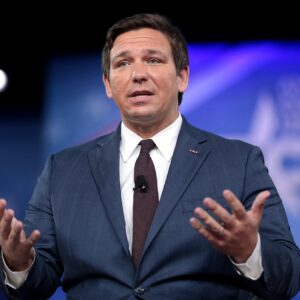Florida governor Ron DeSantis has emerged as the closest thing to a front-runner for the GOP presidential nomination outside of former president Donald Trump. He’s risen to prominence on the strength of a steady political voice and firm conservative policy. It’s a combination that could easily take him far — maybe all the way to the White House.
But for that to happen, the governor may need to find a way to more cautiously balance his desire to engage in the ever-popular culture war with the need to maintain a productive business landscape in Florida.
Nowhere is this balance more at risk than in the state’s dispute with Disney.
For generations, Disney has been a mainstay of Florida’s economy and public profile. For millions of families, Disney and Florida are almost synonymous. By nearly all traditional measures, the relationship between the state and the company has been mutually beneficial in a major way. But the recent impasse between Disney and DeSantis over the state’s so-called “Don’t Say Gay” legislation has put immense strain on a relationship that was among the strongest in the country.
Now, instead of talking about how the state and Disney can best work together to grow Florida’s economy, the two entities remain at loggerheads, with DeSantis working to dismantle Disney’s unique special taxing district and Disney, in turn, indicating it will hold off on sending an additional 2,000 jobs to the Sunshine State until the outlook brightens.
It may all sound like fun and games to the casual observer — nothing more than a sharp politician scoring some points at the expense of a mega-corporation that can afford to take some hits. The reality, though, isn’t quite so innocuous.
The spat with Disney may seem commonplace in today’s incredibly confrontational political landscape. But the troubling implication of DeSantis’ Trump-esque approach to the Disney matter is that he is willing — even eager — to sacrifice economic stability in exchange for the short-term political “sugar rush” that accompanies sparring with a company like Disney. In other words, a few days of headlines and tweets of the “owning the libs” variety appears to be at least as valuable to DeSantis as the long-term symbiotic relationship between a state and one of its most important employers.
The business community abhors uncertainty when it comes to plotting investment and growth. For site selectors charged with weighing the pros and cons of communities as large companies make their expansion plans, interchanges like the Disney spat are evidence of political instability at a minimum. And worse yet, such instability can quickly progress to create a policy landscape that is actively hostile to new investment. After all, if Disney can’t win favor with the governor of Florida, who can?
This type of political grandstanding plays incredibly well for a long-shot candidate attempting to chart a course through the gauntlet that is primary politics — especially when surviving said gauntlet requires a showdown with Trump. In that context, DeSantis’ impulse makes sense.
This same posture doesn’t play quite so well after the primary season when ballots have been cast and the time to govern arrives.
DeSantis’ challenge over the coming year is a daunting one. If he hopes to compete for the nomination, he must demonstrate that he’s capable of slinging mud just like Trump. For good or ill, after all, that is what is expected in today’s system. But slinging mud alone won’t win the day. He also needs to appeal to traditional GOP voters who maintain a strong pro-business orientation — voters who are less moved by the culture war than by a substantive pro-growth policy. It’s a tough needle to thread. But it’s essential.
This balancing act is about more than the nomination. It’s also about good governance in the here and now. The governor has done admirable work in Florida throughout his time in office. Building on those achievements requires focus and substance. The attack on Disney, regrettably, displays an absence of both.

